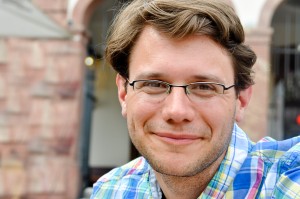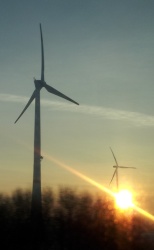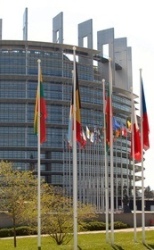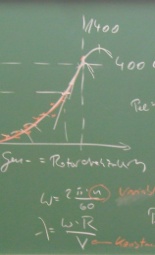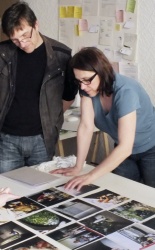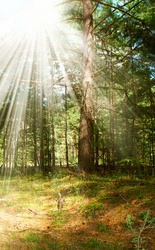Workshop

Energie braucht jeder – und sie geht jeden etwas an. Jeder der Energie verbraucht ist indirekt oder direkt verantwortlich dafür, wie sie erzeugt wird. Die Verantwortung für das atomar-fossile Energiesystem möchte heute fast niemand mehr mit guten Gewissens übernehmen, zu schwer wiegen die negativen Technikfolgen. Die Tage sind also gezählt für das atomar-fossile Zeitalter.
Die erneuerbaren Energien sind die Zukunft und jetzt muss der Fokus auf die Ausgestaltung und Verwirklichung der Vision der vollständigen Versorgung durch erneuerbare Energien gelegt werden. Wie sieht eine solche Vision aus?

Offshore Windpark, Alpha Ventus, Germany
Und wer verfolgt dabei welche Interessen? Ist unser Ziel ein europäisches Supergrid zum Import von Wüstenstrom oder Strom aus riesigen Offshore-Windparks? Dies wäre eine noch zentralistischere Struktur, als wir sie heute schon haben. Oder eher eine dezentrale Versorgung mit kleinen verteilten Kraftwerken? Bauend auf Inselsysteme, bei denen Jeder seinen eigenen Strom selbst erzeugen kann.
Oft ist das Ziel einfach nur “hauptsächlich erneuerbar”. Doch wo im Spannungsfeld zwischen dezentraler und zentralistischer Versorgung wollen wir uns bewegen? Was macht Sinn? Was sind die Auswirkungen auf unsere Gesellschaft und die Herausforderungen und Risiken der jeweiligen Extreme?
Es wird in diesem Workshop zwar auch auf die technischen Möglichkeiten und Herausforderungen eingegangen, jedoch liegt der Schwerpunkt auf der Betrachtung aus den vier Dimensionen der Nachhaltigkeit: Wir beleuchten die erneuerbaren Energien aus technisch/wirtschaftlicher, ökologischer, gesellschaftlicher und kultureller Perspektive. Dabei stellen wir uns viele brennende Fragen und versuchen mit Hilfe ausgezeichneter Experten Antworten zu finden.
Laureates
Nnimmo Bassey, Right Livelihood Award 2010
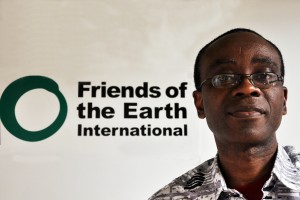
Right Livelihood Award 2010 „…for revealing the full ecological and human horrors of oil production and for his inspired work to strengthen the environmental movement in Nigeria and globally.“
Nnimmo Bassey’s work as Executive Director of Environmental Rights Action in Nigeria and Chair of Friends of the Earth International has turned him into one of Africa’s leading advocates and campaigners for the environment and human rights. Indefatigably, Bassey has stood up against the practices of multinational corporations in his country and the environmental devastation they leave behind destroying the lives and ignoring the rights of the local population.
Andreas Bett, German Environmental Prize 2012

Andreas Bett is the deputy Director of the Fraunhofer Insitute for Solar Energy Systems (Fraunhofer-Institut für Solare Energiesysteme, ISE) in Freiburg, Germany.
„Bett and Lerchenmüller have made an outstanding contribution to the use of solar energy by developing a new solar technology to marketable standard,“ Brickwedde said. What set this concentrator photovoltaics (CPV) apart above all, he said, was its high degree of efficiency. According to Brickwedde, this meant that a relatively large proportion of the energy from sunlight could be converted into electricity, with a module efficiency of around 30 percent being achieved in practice. This made the energy yield of the concentrator technology around twice as large as that of conventional silicon technology, he said.“ (source: dbu.de)
Speakers
Jakob Stör, Soitec
 After my studies of mechatronics (Dresden), and my graduation in „Ingénieur Généraliste“ (Paris/Freiburg) with specialization in energy and environment, I started to work in the area of „concentrated photovoltaics“ (CVP). Since 2008, I am employed in different core areas within the system- and power plant-development. The goal is to install CVP-power plants on sun intensive locations around the world.
After my studies of mechatronics (Dresden), and my graduation in „Ingénieur Généraliste“ (Paris/Freiburg) with specialization in energy and environment, I started to work in the area of „concentrated photovoltaics“ (CVP). Since 2008, I am employed in different core areas within the system- and power plant-development. The goal is to install CVP-power plants on sun intensive locations around the world.
I work in the area of renewable energies, because the idea of an ecologically worthwhile energy source drives me. This means without doubt to switch to alternative forms of energy, which are not dependent on fossil fuels bound to be exhausted in the foreseeable future.
Certainly coming along with climate protection, this is what we owe ourselves and future generations on this planet.
Marc Wilmsen, BARD
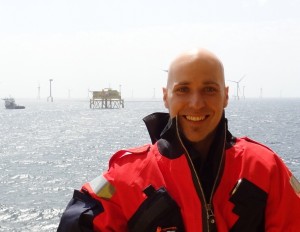
Marc Wilmsen was born in 1980 in Bonn and graduated at the University of Applied Sciences in Bremerhaven.
He currently lives in Emden and works for the German offshore wind pioneer BARD Offshore. As a project coordinator for corrosion protection he is in charge of the cathodic protection issues within the company.
Before Marc Wilmsen came to BARD he worked for a small scale wind turbine manufacturer. The main product was a 10kW wind turbine for clients within the private or farming sector.
„I don’t mind if it is a tiny or a huge turbine – I am passionate for wind.“
“Renewable energies are essential – the source is irrelevant – in any direction and aspect there has to be a change and combination.”
Maria Moorfeld, NABU
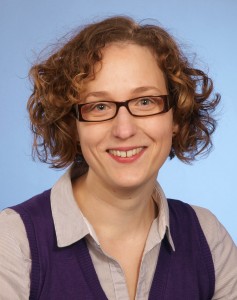
Maria Moorfeld is currently working for the NABU (Nature and Biodiversity Conservation Union) headquarters in Germany/Berlin as a Policy Officer for Nature Conservation and Energy Transition. Her background as a landscape planner and researcher helps her to understand what effects renewable energy sources have on nature and landscape and to develop ideas how their expansion can be managed, avoiding or minimizing these effects. In this field she is working for years now conceptualizing research projects and conducting them.
„The German energy transition and the expansion of renewable energy sources are indispensable against the background of climate change, but both need to go along with acceptance in general, regarding especially the needs of people, nature and landscapes.“
Peter Kolbe, Klimaschutz+ Stiftung
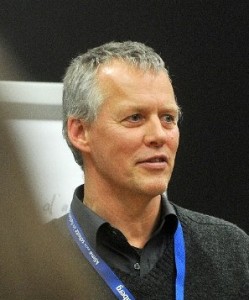
Peter Kolbe, ist Mitgründer und erster Vorsitzender der Klimaschutz+ Stiftung.
Als Projektleiter der Klimaschutz- und Energie-Beratungsagentur Heidelberg – Rhein-Neckar-Kreis verantwortet er die Bereiche Nutzung erneuerbarer Energien, der Energieeffizienz sowie das Erstellen integrierter kommunaler Klimaschutzkonzepte. Neben seinem langjährigen Engagement zur Förderung jugendlichen Engagements und seiner Tätigkeit im Vorstand der Klimaschutz+ Stiftung und Klimaschutz+ Energiegenossenschaft verantwortet er als Initiator von ökostromplus.de den bundesweit einzigen Ökostromtarif der die Energiewende (weg von fossilen- und atomaren- hin zu erneuerbaren Energiequellen) mit der Wende der Energiewirtschaft (weg von Kraftwerken die Kapital- und Investoreninteressen dienen hin zu Kraftwerken die vollständig dem Gemeinwohl dienen) verbindet.
„Solange wir denken, wir könnten das Schaffen einer gesunden, gerechteren und friedlicheren Welt mit den Zielen des heutzutage dominierenden wirtschaftlichen Handelns versöhnen, solange werden Umweltzerstörung, Armut, Ungerechtigkeit, Gewalt und Krieg tagtägliche Realität der menschlichen Familie bleiben, statt das wir ihnen ihren Platz als vergangene Geiseln der Menschheit im Museum der Geschichte zuweisen.“
Luise Neumann-Cosel, BürgerEnergieBerlin

Luise Neumann-Cosel, * 1986, Berlin, Co-Founder of the Cooperative „BürgerEnergie Berlin“, wants to bring Berlins electricity back into the hands of the townspeople.
„There will be only a future with renewable energy. And there will be only a chance to switch to renewables, if the people become part of the decision-making.“
Hosts
Jonas Rohloff
Bachelor in Marine Technologies (Focus Wind Energy) in Bremerhaven, working at Fraunhofer-Institute for windenergy and Energy System Technology, now studying Master Renewable Electrical Energy Supply in Stuttgart, Germany
The longer he deals with the technology of renewable energies, the social aspects move further into the center of his focus and it raises the question of how we want to interact socially with our energy supply?
Nils Hanwahr
Studied literature and philosophy at FU Berlin, UC Berkeley, and the University of Oxford. Nils earned a Master of Science degree in Science Communication from Imperial College London and then went on to work at the Royal Society Science Policy Centre and the Union of German Academies of Sciences and Humanities in Berlin. Whether the turn to renewable energies is successful is not just a matter of technology – I am interested in how institutions and media translate and transform expert knowledge in the process of social and political decision-making.
Further workshops:
Workshop

Everybody needs energy. And everybody should be concerned about it. Everybody using energy is directly and indirectly responsible for how energy is produced. Nowadays nobody can take responsibility for the nuclear-fossil energy-producing system in good conscience – it is too difficult to weight the negative consequences. So, the days of the nuclear-fossil energy system are numbered.
Renewable energies are the future. From now on the focus has to be put on designing and realizing the vision of a complete provision of energy through renewable energies. What does such a vision look like?

Offshore wind farm, Alpha Ventus, Germany
Yet, who pursues which interests? Should our goal be a European “supergrid” with electricity form the desert or huge offshore wind farms – an even more centralized structure as the one that already exists? Or rather a decentralized provision with smaller more dispersed power plants? Then everyone could generate their own electricity.
Often the goal is just “primarily renewable”, but where on the scale between decentralized and centralized energy supply do we want to put the focus? What makes sense? What are the consequences for society, what are challenges and implications of each position?
We will also discuss the technical possibilities and challenges, but the main focus of the workshop are the four pillars of sustainability. We will look at the technical/economic, ecological, social and cultural sides of decentralized and centralized energy production – we will ask ourselves urgent questions and try to find answers.
Laureates
Nnimmo Bassey, Right Livelihood Award 2010

Right Livelihood Award 2010 „…for revealing the full ecological and human horrors of oil production and for his inspired work to strengthen the environmental movement in Nigeria and globally.“
Nnimmo Bassey’s work as Executive Director of Environmental Rights Action in Nigeria and Chair of Friends of the Earth International has turned him into one of Africa’s leading advocates and campaigners for the environment and human rights. Indefatigably, Bassey has stood up against the practices of multinational corporations in his country and the environmental devastation they leave behind destroying the lives and ignoring the rights of the local population.
Andreas Bett, German Environmental Prize 2012

Andreas Bett is the deputy Director of the Fraunhofer Insitute for Solar Energy Systems (Fraunhofer-Institut für Solare Energiesysteme, ISE) in Freiburg, Germany.
„Bett and Lerchenmüller have made an outstanding contribution to the use of solar energy by developing a new solar technology to marketable standard,“ Brickwedde said. What set this concentrator photovoltaics (CPV) apart above all, he said, was its high degree of efficiency. According to Brickwedde, this meant that a relatively large proportion of the energy from sunlight could be converted into electricity, with a module efficiency of around 30 percent being achieved in practice. This made the energy yield of the concentrator technology around twice as large as that of conventional silicon technology, he said.“ (source: dbu.de)
Speakers
Jakob Stör, Soitec
 After my studies of mechatronics (Dresden), and my graduation in „Ingénieur Généraliste“ (Paris/Freiburg) with specialization in energy and environment, I started to work in the area of „concentrated photovoltaics“ (CVP). Since 2008, I am employed in different core areas within the system- and power plant-development. The goal is to install CVP-power plants on sun intensive locations around the world.
After my studies of mechatronics (Dresden), and my graduation in „Ingénieur Généraliste“ (Paris/Freiburg) with specialization in energy and environment, I started to work in the area of „concentrated photovoltaics“ (CVP). Since 2008, I am employed in different core areas within the system- and power plant-development. The goal is to install CVP-power plants on sun intensive locations around the world.
I work in the area of renewable energies, because the idea of an ecologically worthwhile energy source drives me. This means without doubt to switch to alternative forms of energy, which are not dependent on fossil fuels bound to be exhausted in the foreseeable future.
Certainly coming along with climate protection, this is what we owe ourselves and future generations on this planet.
Marc Wilmsen, BARD

Marc Wilmsen was born in 1980 in Bonn and graduated at the University of Applied Sciences in Bremerhaven.
He currently lives in Emden and works for the German offshore wind pioneer BARD Offshore. As a project coordinator for corrosion protection he is in charge of the cathodic protection issues within the company.
Before Marc Wilmsen came to BARD he worked for a small scale wind turbine manufacturer. The main product was a 10kW wind turbine for clients within the private or farming sector.
„I don’t mind if it is a tiny or a huge turbine – I am passionate for wind.“
“Renewable energies are essential – the source is irrelevant – in any direction and aspect there has to be a change and combination.”
Maria Moorfeld, NABU

Maria Moorfeld is currently working for the NABU (Nature and Biodiversity Conservation Union) headquarters in Germany/Berlin as a Policy Officer for Nature Conservation and Energy Transition. Her background as a landscape planner and researcher helps her to understand what effects renewable energy sources have on nature and landscape and to develop ideas how their expansion can be managed, avoiding or minimizing these effects. In this field she is working for years now conceptualizing research projects and conducting them.
„The German energy transition and the expansion of renewable energy sources are indispensable against the background of climate change, but both need to go along with acceptance in general, regarding especially the needs of people, nature and landscapes.“
Peter Kolbe, Klimaschutz+ Foundation

Peter Kolbe is a cofounder and chair of the Klimaschutz+ Foundation. As project director of the Energy and Climate Consultancy Heidelberg – Rhein-Neckar, he is responsible for renewable energy, energy efficiency as well as integrated local concepts for climate protection.
In addition to his promotion of youth activism and his role on the board of the Klimaschutz+ Foundation and the Klimaschutz+ energy-co-op, he is the initiator of ökostromplus.de. Ökostromplus is Germany’s only energy provider of eco-energy that emphasises both the ‘energy turn’ (promoting renewable energies and being independent of nuclear and fossil energy sources) and a rethinking of the energy economy to create a system of energy supply that serves the common interest rather than the special interests of investors.
“As long as we are under the illusion of being able to reconcile the goal of a healthier, just, and more peaceful world with the goals of the currently dominant economic logic, environmental destruction, poverty, inequity, violence and war will be part of the daily reality of the human family. Yet, the goal is to make these scourges of mankind a part of the museum of history.”
Luise Neumann-Cosel, BürgerEnergieBerlin

Luise Neumann-Cosel, * 1986, Berlin, Co-Founder of the Cooperative „BürgerEnergie Berlin“, wants to bring Berlins electricity back into the hands of the townspeople.
„There will be only a future with renewable energy. And there will be only a chance to switch to renewables, if the people become part of the decision-making.“
Hosts
Jonas Rohloff
Bachelor in Marine Technologies (Focus Wind Energy) in Bremerhaven, working at Fraunhofer-Institute for windenergy and Energy System Technology, now studying Master Renewable Electrical Energy Supply in Stuttgart, Germany
The longer he deals with the technology of renewable energies, the social aspects move further into the center of his focus and it raises the question of how we want to interact socially with our energy supply?
Nils Hanwahr
Studied literature and philosophy at FU Berlin, UC Berkeley, and the University of Oxford. Nils earned a Master of Science degree in Science Communication from Imperial College London and then went on to work at the Royal Society Science Policy Centre and the Union of German Academies of Sciences and Humanities in Berlin. Whether the turn to renewable energies is successful is not just a matter of technology – I am interested in how institutions and media translate and transform expert knowledge in the process of social and political decision-making.
Further workshops:


